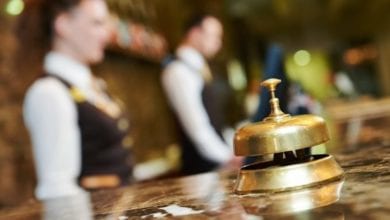Could hotels save UK high streets?
By Andy Jansons, the managing director of Jansons Property

The decline of Britain’s high streets has been an all-too-common story in the media over the past decade, with boarded-up storefronts occupying a space once central to the heart and soul of a city, town or village. Bill Grimsey’s 2018 review in The Independent warned that 100,000 shops could stand empty within a decade, and by July 2021, the BBC reported that nearly one in five units were empty in shopping centres.
As we all know, there are a number of factors that have contributed to the steady deterioration of the high street, including the 2007-08 financial crash, the development of online retail, and in recent years, consecutive lockdowns due to the Covid-19 pandemic.
According to a recent report by the BBC, department stores have seen a 13.4% decrease in sales between March 2020 and March 2022, while clothes shops have experienced an 8.5% sales drop. As a result, instead of bringing people into the town, the high street is often now characterised as an unwelcoming and potentially anti-social space; empty and derelict buildings serve as ideal locations for illegal activities and hotspots for graffiti and vandalism, pushing many people away from spending time in their local towns.
However, there may be a solution to these issues and it comes in the shape of hotels. Many are now arguing that bringing hotels to our high streets is one powerful way to put a stop to this trend and breathe life back into town centres. Hotels are hubs of activity, which by their very nature, bring people from all walks of life together. As part of their offering, most hotels contain restaurants, bars, leisure facilities and meeting spaces for those staying, all of which are usually accessible to both guests and the local population.
Often, the ground floor of a new hotel contains a well-known brand such as a Costa or Starbucks, further bringing people to the high street. These new social ‘destinations’ encourage both hotel users and locals to reacquaint themselves with their town and high street by providing new spaces to visit and spend time in.
A second benefit to be recognised is the promotion of local business that happens indirectly as a result of hotel visitors. Travellers looking for activities to entertain themselves during their stay might ask for recommendations or pick up local leaflets from the lobby advertising local events and offerings. These can often include cinema, theatre, restaurants and local commerce offerings, which then benefit from the patronage of outside visitors. Promotion of the local vicinity can have an impact not only in the short term, but also in the long term, as visitors participate positively in local life. This also encourages local people to visit the high street and an increase in local engagement will lead to economic growth of the high street.
Another notable benefit of a new hotel is the regeneration focus it brings to the high street and to the local area. The development of a hotel is often a stepping stone to gentrification, as it shifts the socio-economic dynamic of an area and encourages investment from other groups.
Furthermore, a hotel development can often include more than just the construction of a hotel, with developments growing to encompass business centres and retail space. The SoCo development in Edinburgh is an excellent example of regeneration in practice; the scheme involved the re-development of a UNESCO World Heritage site which had been destroyed by a fire in 2002. The final product left the area not only with an Ibis Hotel, but a Sainsbury Local store, Costa and the reinstatement of an old nightclub. The regeneration of this area resulted in the further creation of new public realm spaces and the vast improvement of the high street area.
Applying this model to the British high street means hotels become not only a catalyst for regeneration, but a source of civic pride by bringing up the area as a whole. Many of the UK’s high streets are home to iconic buildings which have historically housed large department stores, such as Debenhams or larger shopping centres. Repurposing these buildings goes a long way to revitalising high streets while maintaining the history and pride of a town. In particular, the presence of a big brand such as Hilton or Marriott in these traditional buildings can do a lot to boost civic pride and interest in the local high street.
Finally, hotels are fantastic vehicles for innovation, contributing positively towards the ESG agenda and social advancement of an area. In this new climate of hybrid working and the subsequent loss of many workspaces, many hotels are diversifying their offering by inviting businesses to use their facilities or by providing hybrid workspaces for remote workers.
Hybrid hotels, such as Stay City, are changing how we approach work and business. They offer new ways to travel and work, while simultaneously encouraging social interaction through shared work environments. It is common for this new type of hotel to offer self-contained apartments within hotel complexes, which provide the customer autonomy within a group setting. Many also embody net zero initiatives to provide environmentally friendly services for those looking to reduce their carbon footprint while travelling.
Indirectly, this type of innovative development elevates the ESG status of those businesses who collaborate with the development, meaning that all bodies involved are functioning in a more socially and environmentally efficient way.
Ultimately, hotels certainly have the potential to bring a multitude of benefits to Britain’s high streets and tackle their negative trend downwards. The decision will lie with town councils and hotel developers to see whether they take this opportunity for regeneration and growth.









